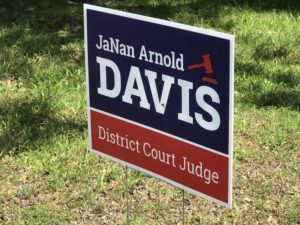Last week, we did two posts about Little Rock District Court Judge candidate JaNan Arnold Davis’s problems when it comes to properly filing campaign-finance reports and (more importantly) when it comes to just following the law for judicial campaigns.
Today, as I was driving to pick up my daughter from school, I happened to drive past one of Davis’s yard signs. Immediately, something seemed off. It had less text than you’d expect. So I circled the block and went back to look more closely.
That’s when I realized what the problem was. See if you can spot it:
That’s right — the sign does not have the standard “Paid for by” language that you see on pretty much all campaign signs, mailers, and other advertisements.
“But wait,” you may be saying if you are still making excuses for why Davis’s failure to follow the same laws as everyone else is not a big deal, “does that even matter?” To which I would say, yes, because the law literally requires it. Arkansas Code Annotated 7-6-228(c)(1) says:
Campaign signs, campaign literature, and other printed campaign materials under this section shall clearly contain the words “Paid for by” followed by the name of the candidate, committee, or person who paid for the campaign sign, campaign literature, or other printed campaign materials.
Would this be a big deal on its own? Probably not. But this is not an isolated incident; it is another part of the same pattern of Davis either being unaware or simply choosing to ignore very basic laws that all candidates know and follow. At the risk of beating a dead horse, this is a person who is running for a judgeship while showing, repeatedly, that she cannot or will not follow the law.
Speaking of not following the law, however, Davis might have much larger problems that simply omitting the “paid for” disclosure from her signs. Following the earlier posts, a reader emailed a voicemail from his cellphone. Take a listen:
That is a robocall with a pre-recorded message from Davis, asking people to vote for her. Thing is, robocalls are governed by the Telephone Consumer Protection Act, and, under the TCPA, there are some very specific requirements for campaign-related robocalls. According to the FCC website (emphases added):
Political campaign-related prerecorded voice or autodialed calls (including autodialed live calls, prerecorded voice messages, and text messages) are:
Prohibited to cell phones, pagers, or other mobile devices without the called party’s prior express consent.[***]
All prerecorded voice message calls, campaign-related and otherwise, must include certain identification information:
the identity of the business, individual, or other entity initiating the call (and if a business or corporate entity, the entity’s official business name) must be stated clearly at the beginning of the message; and the telephone number of the calling party must be provided either during or after the message.
The “prior express consent” required under the TCPA is fact-specific, but it generally requires that the person receiving the call had previously communicated to the campaign, either orally or in writing, that he consented to receiving such calls. The person who sent me the recording said that he had not provided any such express consent, as he had not had any contact with the Davis campaign until this call was received. Additionally, if you listen to the recording, you’ll notice that nowhere during or after the call does it state the telephone number of the calling party.
In addition to being further evidence of a pattern of ignoring laws, robocalls such as this could wind up costing Davis financially. The TCPA creates a private cause of action, in which the person who received the call can sue for either actual damages or statutory damages from $500 to $1500 per call. The FCC can also issue fines of up to $16,000 per call.
There are other candidates in this race, of course, and no candidate is likely to be perfect across the board. But where one candidate has violated at least five different election-related rules, while the others have not, that is absolutely something that voters should consider when deciding who to elect as a judge.
